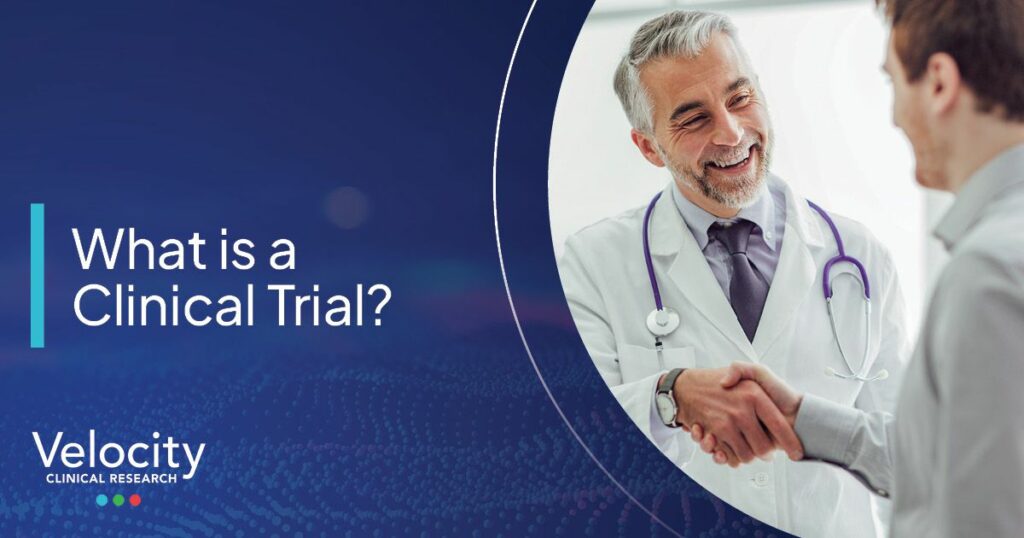Clinical trials are research studies of medications, vaccines, medical devices, procedures, and diagnostics (tests). These studies involve people (a.k.a., participants), and are meant to determine whether certain experimental products are safer and/or more effective than currently approved products.
Without clinical trials, it would be impossible to develop new medicines, cures, vaccines, and other medical products.
Examples of products for which clinical trials are conducted include:
- Vaccines: Influenza, Ebola, SARS-CoV-2 (COVID-19)
- Medications: Topical creams for eczema, oral tablets or injections for multiple sclerosis, liquid cough/cold medications for children
- Medical devices: Electronic devices for migraines, lasers for acne, smartwatches for monitoring movement disorders (e.g., Parkinson’s disease)
- Diagnostics: COVID-19 swab tests, influenza swab tests, home pregnancy tests
Did you know? At Velocity, most clinical trials are interventional, meaning they involve an investigational medical product. However, Velocity also conducts observational studies, which may only involve interviews, patient diaries, or exams.
Clinical trials happen in four phases. Each phase serves a different purpose, and scientists collect important data at every step. Data must be reviewed and approved by the U.S. Food and Drug Administration (FDA) at each stage before a product can proceed to the next phase.
Medical products — including everything from flu vaccines, medications for Alzheimer’s, and pacemakers — must be approved through this process before they can be sold in the commercial market.
- Phase I: 20 to 80 patients In this phase researchers test a new product in a small group of people for the first time to evaluate safety, determine a safe dosage range, and identify side effects. This usually takes less than a year.
- Phase II: Hundreds of Patients The product is given to a larger group of people to study effectiveness and further assess safety. This stage can last for months or years.
- Phase III: Thousands of Patients The product is given to large groups of people to confirm safety, monitor side effects, compare it to other treatments, and collect information that could make it safer to use. This phase usually takes years to complete.
- Phase IV: Consumer Market This phase happens after a product is approved for consumer sale. The product is studied to find additional information about it’s risks, benefits, and best use.
Perfectly healthy people can often participate in clinical trials, as can people with chronic conditions (e.g., multiple sclerosis, diabetes). Even people with debilitating diseases may turn to clinical trials when they struggle to find effective therapies currently on the market.
Velocity’s clinical studies are held to incredibly high standards set by the FDA and Velocity. Every effort is made to ensure patient safety.
If you ever have a question about the study process or currently open studies, ask your doctor or sign up for more information at velocitypatients.com.
Did you know? A popular misbelief is that trials in the term clinical trials means ‘try-it-before-you-buy-it’. In reality, clinical trials are research studies — the experimental products involved in clinical trials are usually not yet FDA-approved for the condition(s) they intend to address, and therefore cannot be sold commercially.

